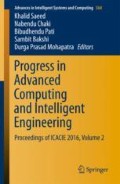Abstract
Given a generalized task that requires a different number of experts for various skills, the team formation problem (TFP) in real-world social networks aims to identify a set of experts that have the requisite skills and can collaborate effectively to accomplish the desired task. This paper considers TFP in realistic settings where the team composition must satisfy certain constraints. Sometimes for a task, only certain suitable experts having high reputation in the team of experts is sufficient to achieve the task. Moreover, not all experts having high reputation/ high expertise are always needed or are available for the task. To evaluate this, we propose a genetic algorithm-based model and introduce risk estimation strategies to determine the suitability of team for a particular task. The experimental results establish that our proposed model is useful for TFP in practical scenarios and discovers more coherent and collectively intelligent teams having low inherent risks.
References
Awal, G.K., Bharadwaj, K.K.: Team formation in social networks based on collective intelligence—an evolutionary approach. Appl. Intell. 41(2), 627–648 (2014)
Bharadwaj, K.K., Al-Shamri, M.Y.H.: Fuzzy computational models for trust and reputation systems. Electron. Commer. Res. Appl. 8(1), 37–47 (2009)
Dorn, C., Skopik, F., Schall, D., Dustdar, S.: Interaction mining and skill-dependent recommendations for multi-objective team composition. Data Knowl. Eng. 70(10), 866–891 (2011)
Fan, Z., Feng, B., Jiang, Z., Fu, N.: A method for member selection of R&D teams using the individual and collaborative information. Expert Syst. Appl. 36(4), 8313–8323 (2009)
Huynh, T.D., Jennings, N.R., Shadbolt, N.R.: FIRE: an integrated trust and reputation model for open multi-agent systems. In: 16th European Conference on Artificial Intelligence, pp. 18–22. IOS Press, Valencia, Spain (2004)
Kargar, M., Aijun, A.: Discovering top-k teams of experts with/without a leader in social networks. In: 20th ACM International Conference on Information and Knowledge Management, pp. 985–994. ACM, New York (2011)
Lappas, T., Liu, K., Terzi, E.: Finding a team of experts in social networks. In: 15th ACM SIGKDD International Conference on Knowledge Discovery and Data Mining, pp. 467–476. ACM, New York (2009)
Li, C-T., Shan, M-K.: Team formation for generalized tasks in expertise social networks. In: 2nd International Conference on Social Computing, pp. 9–16. IEEE, Washington (2010)
Maries, I., Scarlat, E.: Enhancing the computational collective intelligence within communities of practice using trust and reputation models. Trans. Comput. Collective Intell. 3, 74–95 (2011)
Schut, M.C: Scientific Handbook for Simulation of Collective Intelligence. Available under creative commons license version 2 (2007)
Wi, H., Oh, S., Mun, J., Jung, M.: A team formation model based on knowledge and collaboration. Expert Syst. Appl. 36, 9121–9134 (2009)
Acknowledgements
This work is, in part, financially supported by Department of Science and Technology (DST), Government of India through the Inspire program.
Author information
Authors and Affiliations
Corresponding author
Editor information
Editors and Affiliations
Rights and permissions
Copyright information
© 2018 Springer Nature Singapore Pte Ltd.
About this paper
Cite this paper
Awal, G.K., Bharadwaj, K.K. (2018). Constrained Team Formation Using Risk Estimation Based on Reputation and Knowledge. In: Saeed, K., Chaki, N., Pati, B., Bakshi, S., Mohapatra, D. (eds) Progress in Advanced Computing and Intelligent Engineering. Advances in Intelligent Systems and Computing, vol 564. Springer, Singapore. https://doi.org/10.1007/978-981-10-6875-1_24
Download citation
DOI: https://doi.org/10.1007/978-981-10-6875-1_24
Published:
Publisher Name: Springer, Singapore
Print ISBN: 978-981-10-6874-4
Online ISBN: 978-981-10-6875-1
eBook Packages: EngineeringEngineering (R0)

